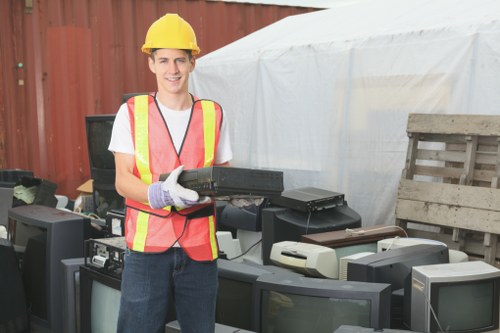Demolition Waste Removal in Cranford
Understanding Demolition Waste Removal

Demolition waste removal is a critical aspect of any construction or demolition project. In Cranford, managing the debris generated from demolitions efficiently ensures that the environment remains clean and safe. Proper waste removal not only complies with local regulations but also promotes sustainable practices by recycling and reusing materials wherever possible.
The process begins with the identification of the types of waste that will be generated. Common demolition materials include concrete, metals, wood, drywall, and hazardous substances like asbestos. Each material requires specific handling and disposal methods to minimize environmental impact.
Engaging a professional demolition waste removal service in Cranford can streamline the entire process. These experts are equipped with the necessary tools and knowledge to handle large volumes of waste, ensuring that everything is disposed of in an eco-friendly manner.
Benefits of Professional Waste Removal Services

Hiring a professional demolition waste removal service offers numerous benefits. Firstly, it ensures compliance with local and federal waste disposal regulations, avoiding potential fines and legal issues. Professionals are well-versed in the specific requirements of Cranford, making the disposal process seamless.
Additionally, professional services contribute to environmental sustainability. By sorting and recycling materials, they reduce the amount of waste sent to landfills, conserving natural resources and reducing greenhouse gas emissions.
Another significant advantage is the safety aspect. Demolition sites can be hazardous, with the risk of accidents and injuries. Trained professionals follow strict safety protocols to protect themselves and the surrounding community during the waste removal process.
Steps Involved in Demolition Waste Removal

The demolition waste removal process typically involves several key steps. Understanding these steps can help you plan your project more effectively:
- Assessment: Evaluating the site to determine the types and quantities of waste generated.
- Planning: Developing a waste management plan that outlines how each type of material will be handled and disposed of.
- Segregation: Sorting materials on-site to facilitate recycling and reduce landfill waste.
- Transportation: Moving the sorted waste to appropriate disposal or recycling facilities.
- Documentation: Maintaining records of waste disposal to ensure compliance with regulations.
Each step is crucial for effective waste management, minimizing environmental impact, and ensuring the project's success.
By following these steps, demolition waste removal services in Cranford can handle projects of any scale, from small residential demolitions to large commercial site clearances.
Environmental Impact and Sustainability

Demolition waste, if not managed properly, can have severe environmental consequences. Improper disposal can lead to soil and water contamination, air pollution, and the depletion of natural resources. By implementing sustainable waste removal practices, Cranford can mitigate these negative impacts.
Recycling materials like metals, wood, and concrete reduces the demand for new raw materials, conserving natural resources and lowering the carbon footprint of construction activities. Many demolition waste removal services in Cranford prioritize recycling to promote environmental sustainability.
Moreover, responsible waste management helps in reducing greenhouse gas emissions. Landfills are significant sources of methane, a potent greenhouse gas. By diverting waste from landfills through recycling and proper disposal, the overall environmental impact of demolition activities is significantly reduced.
Choosing the Right Demolition Waste Removal Service in Cranford

Selecting a reliable demolition waste removal service is essential for the success of your project. Here are some factors to consider when making your choice:
- Experience: Look for companies with a proven track record in demolition waste removal. Experienced professionals are more likely to handle complex projects efficiently.
- Licensing and Certification: Ensure that the service providers are licensed and certified to operate in Cranford. This guarantees that they adhere to industry standards and regulations.
- Recycling Practices: Choose services that prioritize recycling and sustainable waste management practices. This not only benefits the environment but can also be cost-effective.
- Insurance: Verify that the company has adequate insurance coverage to protect against any potential damages or accidents during the waste removal process.
- Customer Reviews: Check reviews and testimonials to gauge the reliability and quality of the service provider.
Taking the time to evaluate these factors will help you select a demolition waste removal service in Cranford that meets your project’s specific needs.
Investing in a reputable service ensures that your demolition project is completed efficiently, safely, and with minimal environmental impact.
Cost Factors in Demolition Waste Removal

Understanding the cost factors involved in demolition waste removal can help you budget your project effectively. Several elements influence the overall cost:
- Volume of Waste: The amount of debris generated directly affects the cost. Larger projects produce more waste, increasing disposal and transportation expenses.
- Type of Materials: Hazardous materials like asbestos require specialized handling and disposal, which can be more expensive than regular waste.
- Accessibility: Sites that are difficult to access may incur additional costs for transportation and equipment usage.
- Location: Disposal fees vary depending on the proximity to recycling facilities and landfills in Cranford.
- Scheduling: Urgent or expedited services may come with higher price tags compared to standard timeframes.
By understanding these cost factors, you can plan accordingly and discuss budget considerations with your chosen waste removal service. Transparent pricing and detailed quotes help avoid unexpected expenses during the project.
Additionally, some services offer package deals or discounts for larger projects, which can provide cost savings without compromising on quality.
Regulatory Compliance and Permits

Demolition projects in Cranford must comply with a range of local, state, and federal regulations. Proper waste removal is a key component of this compliance. Failure to adhere to regulations can result in hefty fines, project delays, and legal complications.
Permits are often required before commencing demolition work. These permits ensure that the project meets safety and environmental standards. Waste removal services typically assist in obtaining the necessary permits, streamlining the approval process.
Additionally, documentation is crucial for regulatory compliance. Detailed records of waste disposal, including types and quantities of materials handled, must be maintained. Professional waste removal services ensure that all documentation is accurate and readily available for inspections.
Innovative Technologies in Waste Removal

The demolition waste removal industry is continuously evolving, with new technologies enhancing efficiency and sustainability. Innovations such as advanced sorting systems, automated recycling processes, and eco-friendly disposal methods are transforming the way waste is managed.
For instance, state-of-the-art machinery can quickly separate different types of materials on-site, reducing the need for manual labor and accelerating the waste removal process. These technologies not only save time but also improve the accuracy of material segregation, ensuring higher recycling rates.
Moreover, digital tools and software are being used to track waste streams, manage logistics, and optimize routes for transportation. This results in reduced fuel consumption, lower operational costs, and a smaller carbon footprint.
Community Impact and Engagement

Demolition waste removal has a significant impact on the local community in Cranford. Proper waste management ensures that neighborhoods remain clean and free from debris, contributing to a healthier living environment.
Engaging with the community is also an essential aspect of waste removal services. By collaborating with local authorities and residents, waste removal companies can address concerns, provide timely updates, and ensure that their operations do not disrupt daily life.
Furthermore, community-focused initiatives, such as recycling drives and educational programs, promote awareness about sustainable waste management practices. These efforts foster a culture of responsibility and environmental stewardship among residents.
Future Trends in Demolition Waste Removal

The future of demolition waste removal in Cranford is poised for significant advancements, driven by increasing environmental awareness and technological progress. Emerging trends focus on enhancing sustainability, efficiency, and compliance.
One notable trend is the shift towards circular economy principles, where materials are continually reused and recycled, minimizing waste and conserving resources. This approach not only benefits the environment but also offers economic advantages by reducing the need for new materials.
Another trend is the integration of artificial intelligence and machine learning in waste management processes. These technologies can predict waste generation patterns, optimize sorting mechanisms, and improve overall operational efficiency.
Case Studies: Successful Waste Removal Projects in Cranford
[IMG_11]Examining successful demolition waste removal projects in Cranford provides valuable insights into effective practices and strategies. These case studies highlight the importance of meticulous planning, professional expertise, and sustainable practices.
For example, a recent residential demolition project successfully diverted 70% of the waste from landfills by implementing comprehensive recycling and reuse strategies. The project involved sorting materials on-site, collaborating with local recycling facilities, and repurposing salvaged materials for new construction purposes.
Another case study involves a commercial demolition site where hazardous materials were safely removed and disposed of according to regulatory standards. The project emphasized safety, compliance, and minimal environmental impact, serving as a model for future undertakings in Cranford.
Challenges in Demolition Waste Removal
[IMG_12]Despite advancements, demolition waste removal in Cranford faces several challenges. Addressing these obstacles is crucial for improving waste management practices and achieving sustainability goals.
One significant challenge is the presence of hazardous materials, such as asbestos and lead-based paints, which require specialized handling and disposal. Ensuring the safe removal of these substances is essential to protect both workers and the environment.
Another challenge is the fluctuating market demand for recycled materials. Variations in demand can impact the economic viability of recycling operations, potentially leading to increased landfill use.
Best Practices for Efficient Waste Removal
[IMG_13]Implementing best practices in demolition waste removal can enhance efficiency, reduce costs, and promote sustainability. Here are some key practices to consider:
- Early Planning: Integrate waste management strategies into the project planning phase to ensure efficient execution.
- Material Identification: Accurately identify and classify materials to facilitate appropriate handling and disposal.
- On-site Sorting: Segregate materials at the source to streamline recycling and reduce contamination.
- Collaboration: Work closely with waste removal services, recycling facilities, and regulatory bodies to ensure compliance and efficiency.
- Continuous Training: Provide ongoing training for workers to stay updated on best practices and safety protocols.
Adopting these practices helps in minimizing waste, lowering costs, and enhancing the overall effectiveness of demolition projects in Cranford.
Furthermore, staying informed about the latest industry trends and technologies can provide a competitive edge and contribute to long-term sustainability.
Conclusion
[IMG_14]Demolition waste removal is an essential component of construction and demolition projects in Cranford. By engaging professional services, adopting sustainable practices, and adhering to regulatory standards, communities can manage waste effectively, protect the environment, and promote public safety.
Whether you are undertaking a small residential demolition or a large commercial project, understanding the intricacies of waste removal can significantly impact the project's success. Investing in reliable waste removal services ensures that debris is handled responsibly, recycled efficiently, and disposed of safely.
Contact us today to learn more about our comprehensive demolition waste removal services in Cranford and make your next project environmentally responsible and hassle-free.